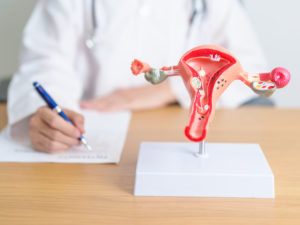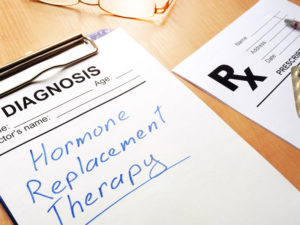A hysterectomy is a significant and life-changing event for any woman.
Whether you’ve already undergone this procedure or your doctor or medical professional just recommended it to address a health concern, it’s essential to be well-informed about the hormonal and emotional transformations you’ll likely go through after a hysterectomy and how to overcome them.
One of these unintended consequences is a decrease in – or a total disruption to – the production of your sex hormones, which are responsible for your reproductive health and many body functions.
And, if a hysterectomy can take a toll on your hormones, a hormonal imbalance after hysterectomy can then impact your overall health and quality of life.
But there’s an effective way to address hormonal imbalance, relieve symptoms, and restore vitality after a hysterectomy – and that’s with BHRT.
Keep reading to get an overview of hysterectomy, including its different types and impact on your hormones. We’ll also discuss the symptoms of hormonal imbalance and how bioidentical hormone replacement therapy (BHRT) can be a valuable tool to help you navigate this journey.
What is a Hysterectomy? Why Do Some Women Need One?
Different Types of Hysterectomy
Do I Still Have Hormones After a Hysterectomy?
Can You Have a Hormonal Imbalance After Hysterectomy?
BHRT: How to Balance Hormones Naturally After Hysterectomy
What Hormones to Take After Hysterectomy
How does BHRT Improve Your Quality of Life After a Hysterectomy?
What is a Hysterectomy? Why Do Some Women Need One?

Hysterectomy refers to a surgical procedure to remove the uterus and, in some cases, other female reproductive organs such as the cervix, fallopian tubes, and ovaries.
Despite being one of the most common surgeries performed in women, a hysterectomy remains a major surgery and you should consider it carefully. In some cases, alternative or less invasive treatment options may be available to you. But other times, it’s your only chance to treat severe health conditions like cancer.
For this reason, the decision to undergo a hysterectomy should be made in consultation with your healthcare professional, considering your health, medical condition, and personal preferences.
In general, doctors or medical professionals recommend the procedure to address one or more of the following health issues:
- Uterine Fibroids
- Endometriosis
- Adenomyosis
- Uterine prolapse
- Uterine or cervical cancer
- Chronic pelvic pain
Different Types of Hysterectomy
Different health issues mean different types of hysterectomy. For example, if your condition affects only your uterus without an impact on the surrounding organs, you’ll likely need a partial hysterectomy. But you’ll probably need a total hysterectomy if you have endometriosis or some severe type of uterine, cervix, or ovarian cancer.
Here are the four different types of hysterectomy:
- Total hysterectomy
- Total hysterectomy with uni- or bi-lateral salpingo-oophorectomy
- Partial hysterectomy
- Radical hysterectomy
We’ll talk about each one of them a bit later. For now, you should be aware that regardless of the type of hysterectomy you undergo, you’ll likely ride a hormonal rollercoaster after the procedure due to hormonal imbalance.
That’s because your ovaries are essential reproductive organs. Even if they’re not removed during the surgery, they may get compromised or suffer some dysfunction, causing a decline in your essential hormones and, consequently, a hormonal imbalance. That may happen due to removing your uterus, which shares some blood supply with your ovaries.
To understand how each type of hysterectomy may cause hormonal imbalance and affect your overall wellbeing, let’s first understand how sex hormones influence your body functions.
Bearing the following information in mind will give you an idea of what hormones to take after hysterectomy – whether that’s a partial hysterectomy or a total or radical hysterectomy.
Female Hormones and Their Functions
 Your ovaries produce and release three natural hormones essential to some physiological functions, including
Your ovaries produce and release three natural hormones essential to some physiological functions, including
- regulating your menstrual cycle,
- supporting fertility,
- maintaining bone and cardiovascular health, and
- influencing mood and wellbeing.
They three hormones are:
Estrogen
Estrogen is crucial for your health.
It plays a central role in regulating your menstrual cycle, supporting the development of your sexual characteristics, and influencing various aspects of female physiology. It helps maintain the health of your reproductive organs, bones, and cardiovascular system.
In addition, it can also affect your mood and cognitive function.
Progesterone
Progesterone is a vital hormone in a woman’s body, with the most important role being the preparation of the uterus for pregnancy and the support of pregnancy if it occurs. It regulates your menstrual cycle, influences your mood, and improves your breast and bone health.
Your ovaries produce this essential hormone during the second half of your menstrual cycle, primarily after ovulation.
Testosterone
While often associated with men, your ovaries produce a small amount of testosterone. This hormone maintains muscle mass, bone density, and libido in women. It also plays a role in your overall energy, motivation, mood and vitality.
However, after a hysterectomy, testosterone production is also affected, directly impacting your sexual drive and function.
The balance and appropriate levels of these three hormones are critical for female health and wellbeing. So, with your natural production compromised after a hysterectomy, you’re at greater risk of suffering menopausal symptoms caused by hormonal imbalance.
Depending on your surgery type, these symptoms may be mild to severe.
Let’s now look at the possible hormonal impact on you after hysterectomy, according to which type of hysterectomy you have.
Do I Still Have Hormones After a Hysterectomy?

Right now, you’re probably thinking: Do I still have hormones after a hysterectomy?
And the answer is not that simple. First, because each body is unique. So, your body may experience a different kind of hormonal imbalance than someone else’s.
And second, because hormonal imbalance after hysterectomy surgeries generally depends on whether you have your ovaries removed during the procedure – and the type of surgery. Let’s dive deep into how each kind of hysterectomy brings hormonal changes and affects your overall health.
Total Hysterectomy
In a total hysterectomy, the doctor removes your entire uterus – including your cervix – and possibly one or both ovaries and your fallopian tubes as well. The impact on hormones depends on whether or not your ovaries are preserved.
If they keep your ovaries intact (i.e., not performing an oophorectomy), your hormone production typically continues as before the surgery, and menopause doesn’t occur immediately.
So, do you need hormone replacement after a total hysterectomy?
Well, it depends. If your ovaries are intact, not necessarily.
But if one or both ovaries are removed during total hysterectomy, this results in surgical menopause, meaning your essential hormones significantly drop, or the production completely stops. This leads to hormonal imbalance and immediate menopause symptoms.
In that case, hormone replacement will certainly help you cope with the changes.
Partial Hysterectomy
In a partial hysterectomy, the doctor only removes the upper part of your uterus and leaves your cervix and ovaries intact. This means your hormone production sometimes remains unaffected.
However, there’s still some risk of potential hormonal imbalance, as the blood supply between your uterus and ovaries is interrupted. In some cases, this may lead to ovarian atrophy, failure, or dysfunction – which will affect your hormones.
Radical Hysterectomy
A radical hysterectomy removes your entire uterus, cervix, and sometimes nearby tissues and lymph nodes. One or both ovaries and fallopian tubes may also be removed, but that’s not always the case.
Doctors usually avoid recommending the removal of both ovaries in order to reduce the impact on your hormones and avoid hormonal imbalance.
Still, this can be the choice in treating specific cases. If that’s you, there’s an increased chance of experiencing immediate menopause.
Can You Have a Hormonal Imbalance After Hysterectomy?

While hormonal fluctuation is a normal part of your life, women who’ve experienced a sudden drop in hormone levels, such as those entering menopause due to a hysterectomy, may experience sudden mild to severe symptoms and side effects. These include the following among others:
- Hot flashes
- Night sweats
- Mood swings
- Vaginal dryness
- Low sex drive
- Brain fog
- Fatigue
- Urinary incontinence
- Increased risk of osteoporosis and cardiovascular diseases
- Depression and anxiety
- Insomnia
In addition, don’t underestimate the impact of hormonal imbalance on mental and emotional wellbeing.
While natural menopause gradually prepares you for all these physiological and emotional transformations, experiencing sudden and early menopause can significantly affect your self-esteem, confidence, and overall health. Not to mention the heavyweight some women feel about not being able to conceive naturally.
But the good news is that this emotional drain is typically caused by hormonal imbalance, and there’s an effective and natural solution to address that: bioidentical hormone replacement therapy (BHRT).
BHRT: How to Balance Hormones Naturally After Hysterectomy
If you’re feeling the impact of hysterectomy on your hormone levels, mood, sex drive, and overall wellbeing, you’re not alone. But you don’t need to settle for that. A hysterectomy is not the final result. You can regain your vitality in natural ways after undergoing hysterectomy.
To prove that, we’ll demonstrate what is the best hormone replacement after hysterectomy: It’s bioidentical hormone replacement therapy.
What Hormones to Take After Hysterectomy
BHRT is a valuable natural tool in managing hormonal imbalance after hysterectomy. That’s because it uses bioidentical hormones – hormones chemically identical to those your body naturally produces – to restore your hormone levels to pre-hysterectomy levels.
Unlike traditional hormone replacement therapy (HRT) – which uses synthetic hormones with standard dosages to address hormonal imbalance – these bioidentical hormones offer a personalized and natural solution. They can relieve all the uncomfortable and inevitable transformations you undergo after a hysterectomy, whether partial hysterectomy, radical, or total. What’s not to love?
Let’s look at some of the many benefits when bioidentical hormones help you manage hormonal imbalance after a hysterectomy.
How Does BHRT Improve Your Quality of Life After a Hysterectomy?
Relieves Immediate Menopausal Symptoms
If you’re experiencing surgical menopause after removing your ovaries during a hysterectomy, BHRT can effectively alleviate hormone imbalance and menopausal symptoms such as hot flashes, night sweats, mood swings, and vaginal dryness.
Your customized treatment provides the proper dosage of hormones like estrogen and progesterone to replace those your body no longer produces. This helps rebalance your hormone levels and relieve your symptoms.
Preserves Bone Health
Estrogen plays a vital role in maintaining your bone density. After a hysterectomy, your estrogen levels decline, which can increase your risk of osteoporosis. And osteoporosis can lead to breakages if you fall.
BHRT – especially focused on estrogen therapy – can therefore help mitigate this risk by providing your body with the estrogen it needs for bone health.
Supports Cardiovascular Health
Estrogen also has a protective effect on the cardiovascular system.
However, with the decrease in estrogen levels caused by natural or surgical menopause following hysterectomy, women may experience an increased risk of heart disease. After hysterectomy surgery, you need to replace the estrogen your body no longer produces with another source to protect your cardiovascular health. BHRT is a natural treatment for this.
Improves Mood and Wellbeing
You’re not alone if you don’t feel “yourself” after a hysterectomy. Hormonal imbalance – such as low or no estrogen – can affect your mood and emotional wellbeing.
But BHRT can stabilize your hormone levels. Your customized treatment can potentially reduce symptoms of depression, anxiety, and irritability that may occur after a hysterectomy.
Enhances Libido and Sexual Function
A decline in hormone levels can also affect your sexual desire and function. But BHRT can restore your libido, alleviate vaginal dryness, and enhance your overall sexual satisfaction.
Offers Individualized Treatment
BHRT respects your body’s unique needs. Unlike traditional HRT that uses synthetic hormones, BHRT is tailored to your specific hormonal needs.
After assessing your hormone levels through blood tests and comprehensive exams, your healthcare professional customizes your BHRT treatment to address your specific hormonal imbalance – which optimizes its effectiveness and minimizes any side effects.
Post-Hysterectomy Hormonal Imbalance: Let Nava Help You with BHRT

You’ve seen the benefits and transformative power of BHRT to address hormone imbalance after hysterectomy. But how do you go about starting?
At Nava Health, our tailored BHRT solutions are designed to help you restore your optimal health and wellbeing.
Our team of BHRT experts will conduct a comprehensive assessment to establish how your hormone levels have responded to partial hysterectomy, total hysterectomy, or radical hysterectomy – because your body is unique. We’ll then discuss the potential benefits and risks of BHRT for you, and create an individualized treatment plan that best addresses your hormone imbalance and health goals post hysterectomy.
In addition to BHRT treatment post hysterectomy, your Nava customized health plan includes lifestyle adjustments such as improved diet and exercise plans. This integrative approach helps you navigate hormonal changes after a hysterectomy and also maintain your overall wellbeing. We want you to achieve healthy longevity!
Contact us today to schedule your personalized consultation and take the first step toward reclaiming your life.



